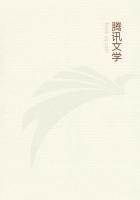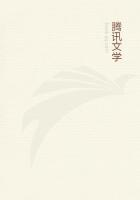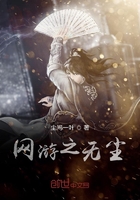Then he caught up the reins from the chariot-rail, first fitting his feet exactly in the hollows made for them. But first with outspread palms he called upon the gods, "O Zeus, now strike me dead, if Ihave sinned, and let my father learn how he is wronging me, in death at least, if not in life." Therewith he seized the whip and lashed each horse in turn; while we, close by his chariot, near the reins, kept up with him along the road that leads direct to Argos and Epidaurus. And just as we were coming to a desert spot, a strip of sand beyond the borders of this country, sloping right to the Saronic gulf, there issued thence a deep rumbling sound, as it were an earthquake, fearsome noise, and the horses reared their heads and pricked their ears, while we were filled with wild alarm to know whence came the sound; when, as we gazed toward the wave-beat shore, a wave tremendous we beheld towering to the skies, so that from our view the cliffs of Sciron vanished, for it hid the isthmus and the rock of Asclepius; then swelling and frothing with a crest of foam, the sea discharged it toward the beach where stood the harnessed car, and in the moment that it broke, that mighty wall of waters, there issued from the wave a monstrous bull, whose bellowing filled the land with fearsome echoes, a sight too awful as it seemed to us who witnessed it. A panic seized the horses there and then, but our master, to horses' ways quite used, gripped in both hands his reins, and tying them to his body pulled them backward as the sailor pulls his oar; but the horses gnashed the forged bits between their teeth and bore him wildly on, regardless of their master's guiding hand or rein or jointed car. And oft as he would take the guiding rein and steer for softer ground, showed that bull in front to turn him back again, maddening his team with terror; but if in their frantic career they ran towards the rocks, he would draw nigh the chariot-rail, keeping up with them, until, suddenly dashing the wheel against a stone, he upset and wrecked the car; then was dire confusion, axle-boxes and linchpins springing into the air. While he, poor youth, entangled in the reins was dragged along, bound by a stubborn knot, his poor head dashed against the rocks, his flesh all torn, the while he cried out piteously, "Stay, stay, my horses whom my own hand hath fed at the manger, destroy me not utterly. O luckless curse of a father! Will no one come and save me for all my virtue?" Now we, though much we longed to help, were left far behind. At last, I know not how, he broke loose from the shapely reins that bound him, a faint breath of life still in him; but the horses disappeared, and that portentous bull, among the rocky ground, I know not where. I am but a slave in thy house, 'tis true, O king, yet will I never believe so monstrous a charge against thy son's character, no! not though the whole race of womankind should hang itself, or one should fill with writing every pine-tree tablet grown on Ida, sure as I am of his uprightness.
LEADER
Alas! new troubles come to plague us, nor is there any escape from fate and necessity.
THESEUS
My hatred for him who hath thus suffered made me glad at thy tidings, yet from regard for the gods and him, because he is my son, Ifeel neither joy nor sorrow at his sufferings.
MESSENGER
But say, are we to bring the victim hither, or how are we to fulfil thy wishes? Bethink thee; if by me thou wilt be schooled, thou wilt not harshly treat thy son in his sad plight.
THESEUS
Bring him hither, that when I see him face to face, who hath denied having polluted my wife's honour, I may by words and heaven's visitation convict him.
(The MESSENGER departs.)
CHORUS (singing)
Ah! Cypris, thine the hand that guides the stubborn hearts of gods and men; thine, and that attendant boy's, who, with painted plumage gay, flutters round his victims on lightning wing. O'er the land and booming deep on golden pinion borne flits the god of Love, maddening the heart and beguiling the senses of all whom he attacks, savage whelps on mountains bred, ocean's monsters, creatures of this sun-warmed earth, and man; thine, O Cypris, thine alone the sovereign power to rule them all.
(ARTEMIS appears above.)
ARTEMIS (chanting)
Hearken, I bid thee, noble son of Aegeus: lo! 'tis I, Latona's child, that speak, I, Artemis. Why, Theseus, to thy sorrow dost thou rejoice at these tidings, seeing that thou hast slain thy son most impiously, listening to a charge not clearly proved, but falsely sworn to by thy wife? though clearly has the curse therefrom upon thee fallen. Why dost thou not for very shame hide beneath the dark places of the earth, or change thy human life and soar on wings to escape this tribulation? 'Mongst men of honour thou hast now no share in life.
(She now speaks.)
Hearken, Theseus; I will put thy wretched case. Yet will it naught avail thee, if I do, but vex thy heart; still with this intent I came, to show thy son's pure heart,-that he may die with honour,-as well the frenzy and, in a sense, the nobleness of thy wife; for she was cruelly stung with a passion for thy son by that goddess whom all we, that joy in virgin purity, detest. And though she strove to conquer love by resolution, yet by no fault of hers she fell, thanks to her nurse's strategy, who did reveal her malady unto thy son under oath. But he would none of her counsels, as indeed was right, nor yet, when thou didst revile him, would he break the oath he swore, from piety. She meantime, fearful of being found out, wrote a lying letter, destroying by guile thy son, but yet persuading thee.
THESEUS
Woe is me!
ARTEMIS
Doth my story wound thee, Theseus? Be still awhile; hear what follows, so wilt thou have more cause to groan. Dost remember those three prayers thy father granted thee, fraught with certain issue?















